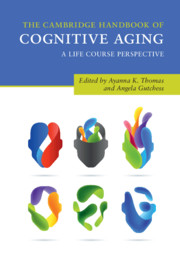Book contents
- The Cambridge Handbook of Cognitive Aging
- The Cambridge Handbook of Cognitive Aging
- Copyright page
- Contents
- Figures
- Tables
- Contributors
- Introduction
- Part I Models of Cognitive Aging
- Part II Mechanisms of Cognitive Aging
- Part III Aging in a Socioemotional Context
- Part IV Cognitive, Social, and Biological Factors across the Lifespan
- 23 Prenatal Influences on Cognitive Aging
- 24 Associations between Activity Participation across the Life Course and Cognitive Aging
- 25 Cognitive Aging and Culture: Older Brain Predictions about Different Environments
- 26 Current Perspectives on Aging and Bilingualism across the Life Span
- 27 Grit and Successful Aging
- 28 Control and Cognition: Contextual and Individual Differences in Cognitive Aging
- 29 Cognition and Well-Being across Adulthood and Old Age
- 30 The Genetics of Cognitive Abilities
- 31 Blood Biomarkers of Cognitive Health and Neurodegenerative Disease
- Part IV Summary: Early Life and Biological Factors
- Part V Later Life and Interventions
- Index
- Plate Section (PDF Only)
- References
28 - Control and Cognition: Contextual and Individual Differences in Cognitive Aging
from Part IV - Cognitive, Social, and Biological Factors across the Lifespan
Published online by Cambridge University Press: 28 May 2020
- The Cambridge Handbook of Cognitive Aging
- The Cambridge Handbook of Cognitive Aging
- Copyright page
- Contents
- Figures
- Tables
- Contributors
- Introduction
- Part I Models of Cognitive Aging
- Part II Mechanisms of Cognitive Aging
- Part III Aging in a Socioemotional Context
- Part IV Cognitive, Social, and Biological Factors across the Lifespan
- 23 Prenatal Influences on Cognitive Aging
- 24 Associations between Activity Participation across the Life Course and Cognitive Aging
- 25 Cognitive Aging and Culture: Older Brain Predictions about Different Environments
- 26 Current Perspectives on Aging and Bilingualism across the Life Span
- 27 Grit and Successful Aging
- 28 Control and Cognition: Contextual and Individual Differences in Cognitive Aging
- 29 Cognition and Well-Being across Adulthood and Old Age
- 30 The Genetics of Cognitive Abilities
- 31 Blood Biomarkers of Cognitive Health and Neurodegenerative Disease
- Part IV Summary: Early Life and Biological Factors
- Part V Later Life and Interventions
- Index
- Plate Section (PDF Only)
- References
Summary
Sense of control over one’s life declines in the later portion of the life span, which is not surprising in the face of increased losses and decreased gains associated with aging. Unfortunately, the maintenance of sense of control is a key indicator of successful aging while low control beliefs are a risk factor for poor aging-related outcomes, such as lower concurrent and subsequent cognitive functioning. The simultaneous focus on the person and the environment is an important characteristic of research on control beliefs. We synthesize the state of the field and discuss the current understanding of the complex interplay of control beliefs and cognition. In addition, we propose that awareness of aging, which is the subjective interpretation of aging, may be an important future direction to elucidate the control-cognition relationships.
Keywords
- Type
- Chapter
- Information
- The Cambridge Handbook of Cognitive AgingA Life Course Perspective, pp. 514 - 531Publisher: Cambridge University PressPrint publication year: 2020
References
- 1
- Cited by

